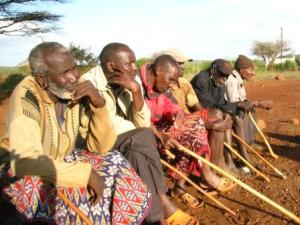It was hard to leave Korr. Despite the suffocating heat, the wind blew, the food and accommodations were great and the friends were many. Maina and Omar made numerous trips to town, trying to find anyone with some diesel that we could buy – the arduous driving in the sand used up more fuel than we had planned. So it took us a while to get started in our journey across the Kaisut Desert that would take us to the main road and the village of Karare where we had a meeting with community leaders.
In our travels since we left Loiyangalani, we have been dropping off Mentors at their villages and at the same time, gaining new passengers. In a land where there is no public transportation, everyone relies on the kindness of others to provide a lift. In Ngurunit, my vehicle lost two mentors but gained one elderly Samburu woman and two warriors, one of whom vomited out the back window of the land cruiser the entire way to Korr. Now I have gained two new passengers in the back seat, as has Kura. Finally, at midday, at the height of the heat, we leave Korr.
Our vehicles fly across the Kaisut.
“Kama lami!” Semeji whoops. (Like tarmac!)
There are long stretches of flat surface that allow me to keep the vehicle in one gear for more than 30 seconds, a first on this trip. Then we reach large stands of young acacia trees, dripping with the sap that the locals collect and sell to the gum and resin wholesalers. The vehicles then wander through the ruts and sand slowly, eventually emerging into another flat stretch. I beat Kura the whole way until we reach the last bit of deep sand. Then the Defender kicks in, leaving us in a cloud of sand and dust.
That afternoon we had an information session about REAP to deliver to the elders and chief as well as the women leaders of the village of Karare. But first we had to drop Brown and baby Jessica off in Kamboe and negotiate the torn up and corrugated main road to Karare. This “main road” that intersects the eastern boundary of Laisamis district is also the Pan Africa highway, the Cape Town to Cairo Road. And the northern Kenya section has always been considered one of the roughest and most dangerous parts of the route. All of this is expected to change when the Chinese (or is it the Israeli’s? – so many rumors here….) complete the road all the way to the Ethiopian border.
After a brief visit with the Chief, Anthony Galsaracho, in his office, a group of elders and women are quickly assembled under the wide branches of a large acacia tree. The women sit on the ground and three chairs are brought out for Kura, the Chief and me. The elders all squeeze onto one long bench, the long walking sticks that they carry protruding past their legs.
The Chief opens the meeting, speaking in Swahili. A woman with a comfortable sense of authority, Maley Sahado, translates into Samburu. Kura then speaks, explaining our program and then I am invited to say a few words. I thank the people for once again welcoming me to Karare. I struggle to find the right words that will communicate our commitment to remain with the people and our programs. This meeting is a courtesy call to the community and Kura and I have had dozens of these meetings. But we are also one of thousands of organizations that come to poor villages throughout Africa and promise a life that will be easier.
It is in times such as this, combined with the knowledge of the coming drought, that gives our work a sense of urgency. We need to work harder to secure the funding for seed capital and training so that the very poorest in the pastoral communities will have an income that will sustain them through a drought that will once again bring famine and disease. Reaching the harder to reach and insecure places, like Kargi and Kirkuum, must also be a priority.
The hopes and aspirations of the women assembled before me are reflected back to me in their smiling faces. I am overwhelmed. Our funding continues to pour in. We are hiring good people as we grow. We have the monitoring systems in place for the prudent expenditure of every penny. But it will never be enough. I am reminded of the Karen Blixen quote, Kura’s and my mantra, that is posted above my desk in Vermont:
When you have a great and difficult task, something perhaps almost impossible, if you only work a little at a time, every day a little, even without faith, even without hope….Suddenly the work will find itself.


